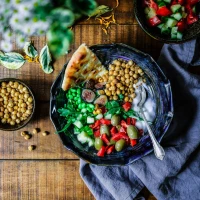In the modern world, where fast food chains and processed food products dominate our diets, it has become increasingly important to prioritize our health and well-being. One way to do this is by incorporating organic food into our daily meals. Organic food offers a myriad of benefits, from providing essential nutrients to supporting sustainable farming practices. In this article, we will explore the world of organic food and how it can nourish both your body and soul.
What is Organic Food?
Organic food refers to produce and other agricultural products that are grown without the use of synthetic fertilizers, pesticides, genetically modified organisms (GMOs), antibiotics, or growth hormones. These foods are cultivated using natural farming methods, such as crop rotation, composting, and biological pest control. Additionally, organic farmers prioritize the use of renewable resources and conservation of soil and water to maintain the ecological balance of their farms.
The Benefits of Organic Food
1. Nutrient-Rich Delights
Organic food is known for its superior nutritional content compared to conventionally grown food. Numerous studies have shown that organic fruits and vegetables are richer in vitamins, minerals, and antioxidants allure beauty box spoilers september 2023. This is because organic farming practices focus on building healthy and fertile soil, which enhances the nutrient content of the crops. By choosing organic food, you are providing your body with a higher level of essential nutrients that can support your overall health.
2. Reduced Exposure to Chemicals
One of the primary reasons people opt for organic food is to minimize their exposure to harmful chemicals. Conventionally grown crops are often sprayed with synthetic pesticides and herbicides, which can leave behind residues on the food we consume. These chemical residues have been linked to various health issues, including hormonal disruptions, developmental problems, and an increased risk of certain diseases. By choosing organic food, you can significantly reduce your intake of these potentially harmful substances.
3. Environmental Impact
The impact of conventional farming practices on the environment is a major concern today. The use of synthetic fertilizers and pesticides can contaminate soil, waterways, and harm beneficial insects and wildlife. Organic farming, on the other hand, prioritizes environmental sustainability by promoting biodiversity, conserving water, and reducing soil erosion. By supporting organic farming, you contribute to the preservation of our ecosystems and reduce the carbon footprint associated with food production.
4. Supporting Local Farmers
Another advantage of choosing organic food is that it supports local farmers and small-scale agricultural practices. Organic farming often involves smaller farms that prioritize regenerative and sustainable techniques. By purchasing locally grown organic produce, you not only get access to fresh and seasonal delights but also contribute to the growth of local economies and communities.
Common Misconceptions about Organic Food
Despite its numerous benefits, organic food often faces misconceptions and myths. Addressing these misconceptions can help people make informed decisions about their food choices.
Myth 1: Organic Food is Expensive
One common misconception is that organic food is excessively expensive compared to conventionally produced food. While it is true that organic food can sometimes be slightly more expensive, it is essential to consider the long-term benefits it offers. Investing in your health and supporting sustainable farming practices can have significant positive impacts on your overall well-being and the environment.
Myth 2: Organic Food is the Same as Locally Grown Food
Another misconception is that all locally grown food is organic. While it is true that some locally sourced food may be produced using organic methods, it is not always the case. To ensure that you are buying organic food, look for specific organic certifications or labels that guarantee compliance with organic farming standards.
Myth 3: Organic Food is Tasteless
There is a common misconception that organic food lacks flavor compared to conventionally produced food. However, this is far from the truth. Organic food often has more vibrant and natural flavors since it is grown in nutrient-rich soil. Many people find that organic fruits, vegetables, and other organic products have a more authentic taste.
Incorporating Organic Food into Your Diet
Now that we have established the benefits and addressed some common misconceptions about organic food, let’s explore ways to incorporate it into your diet.
1. Shop at Local Farmers Markets
One of the best ways to find fresh, organic produce is by visiting your local farmers market. Farmers markets offer a wide range of organic fruits, vegetables, meat, dairy products, and even pantry staples. Not only will you get access to high-quality organic food, but you will also support local farmers and build a connection with your community.
2. Join a Community Supported Agriculture (CSA) Program
Community Supported Agriculture programs allow you to become a member of a local farm and receive a share of the harvest. By joining a CSA program, you can enjoy a weekly or monthly box of fresh, organic produce straight from the farm. This not only ensures that you have a regular supply of organic food but also helps to build a direct relationship with the farmers who grow your food.
3. Grow Your Own Organic Garden
If space allows, consider growing your own organic garden. Planting herbs, vegetables, and fruits in your backyard or even on your balcony can be a rewarding experience. You have full control over the cultivation process, allowing you to prioritize organic methods and enjoy the freshest produce possible.
4. Read Labels and Look for Organic Certifications
When shopping at grocery stores, make it a habit to read labels and look for organic certifications. In the United States, the USDA Organic seal signifies that the product has met strict organic farming standards. Similarly, other countries have their own organic certifications that you can look out for. By familiarizing yourself with these certifications, you can make informed choices and ensure that the food you purchase is truly organic.
Comparison Chart: Organic vs. Conventional Food
To better understand the differences between organic and conventional food, let’s take a look at a comparison chart:
| Aspect | Organic Food | Conventional Food |
|---|---|---|
| Farming Methods | Natural, sustainable practices | Synthetic fertilizers and pesticides |
| Nutrient Content | Higher nutrient content | Lower nutrient content |
| Chemical Residues | Minimal to none | Potential chemical residues |
| Environmental Impact | Promotes biodiversity and sustainability | Soil and water contamination, harm to beneficial insects |
| Taste | Authentic flavors | Sometimes less flavorful |
| GMOs | Prohibited | Sometimes used in crop production |
| Price | Can be slightly higher | Can vary depending on market conditions |
Also you can read our related content: Ground Beef Meal Prep Containers are a convenient and practical solution for busy individuals who aim to eat nutritious, homemade meals throughout the week. These containers allow you to portion out your meals in advance, ensuring that you have delicious and protein-packed dishes ready to go whenever hunger strikes. With ground beef as the base ingredient, the possibilities are endless – from flavorful meatballs and hearty chili to mouthwatering burgers and comforting casseroles. These containers provide airtight storage, keeping your meals fresh and flavorful for days, and their stackable design saves valuable fridge and freezer space. Whether you’re an athlete looking to refuel or simply someone who values home-cooked convenience, ground beef meal prep containers are a game-changer in simplifying your weekly meal planning.
Final Thoughts
Choosing organic food is not just about nourishing your body with nutrient-rich delights. It is a conscious decision to support sustainable farming practices, reduce exposure to harmful chemicals, and promote the well-being of local communities and the environment. By incorporating organic food into your diet, you take a step towards living a healthier, more sustainable lifestyle. So next time you shop for groceries or plan your meals, consider reaching for organic options and savor the goodness it brings to your body and soul.










